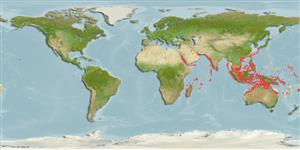Environment: milieu / climate zone / depth range / distribution range
Sinh thái học
Biển Cùng sống ở rạn san hô; không di cư; Mức độ sâu 3 - 60 m (Ref. 68964), usually 3 - 60 m (Ref. 5222). Tropical; 31°N - 31°S, 30°E - 178°W (Ref. 5222)
Indo-West Pacific: Red Sea to South Africa and east to the Gilbert Islands. Probably found in all tropical islands of the Indian Ocean. Also reported from Persian Gulf (Ref. 68964). Recorded from Europa Island (MNHN 1992-0475, Ref. 33390).
Length at first maturity / Bộ gần gũi / Khối lượng (Trọng lượng) / Age
Maturity: Lm ?, range 34 - ? cm
Max length : 60.0 cm TL con đực/không giới tính; (Ref. 4787)
Các tia vây lưng cứng (tổng cộng) : 9; Các vây lưng mềm (tổng cộng) : 17 - 18; Tia cứng vây hậu môn: 3; Tia mềm vây hậu môn: 8 - 9. This species is distinguished by the following characters: deep and compressed body with greatest depth 2.1-2.4 in SL; dorsal head profile steep, straight, or slightly concave along snout and distinctly convex from eye to dorsal fin; longitudinal scale series 94-104; gill rakers 8-11 + 15-17; in adults the middle dorsal and anal-fin rays are elongated, giving these fins an angular profile, with the rear margin almost vertical; caudal fin truncate, 8 branched rays in upper lobe and 7 in lower lobe; pectoral fins asymmetric, 17-19 rays. Colour of body dark brown to black, occasionally with an orange cast, usually with a pale vertical bar on side of abdomen; inside of mouth, gill cavity and upper jaw membranes reddish orange; juveniles with a broad white posterior margin on caudal fin and a narrow white margin on soft dorsal fin (Ref 5222).
Adults are found in coastal reefs and lagoons, often on silty habitat (Ref. 48635), in or near caves and holes in the reef. They feed mainly on small fishes (including Pempheris sp.), also on stomatopods (Pseudosquilla sp.) (Ref. 6448); and crustaceans (Ref. 37816). Preliminary data indicate that mature individuals spawn at any time of the year and mature (females?) at about 35 cm SL (Ref. 6448). Small juveniles mimic Centropyge vrolikii (Ref. 8631), and C. nox until they outgrow their model in size (Ref. 48635). Taken as part of the live reef food fish trade centered in China and In Hong Kong and are occasionally found in markets (Ref. 89707). They are caught with hook-and-line, spear, and probably in traps (Ref. 39231).
Life cycle and mating behavior
Maturities | Sự tái sinh sản | Spawnings | Egg(s) | Fecundities | Ấu trùng
Heemstra, P.C. and J.E. Randall, 1993. FAO Species Catalogue. Vol. 16. Groupers of the world (family Serranidae, subfamily Epinephelinae). An annotated and illustrated catalogue of the grouper, rockcod, hind, coral grouper and lyretail species known to date. Rome: FAO. FAO Fish. Synop. 125(16):382 p. (Ref. 5222)
IUCN Red List Status (Ref. 130435)
Threat to humans
Harmless
Human uses
Các nghề cá: buôn bán nhỏ; cá để chơi: đúng
Các công cụ
Special reports
Download XML
Các nguồn internet
Estimates based on models
Preferred temperature (Ref.
123201): 24.1 - 29, mean 27.9 °C (based on 2908 cells).
Phylogenetic diversity index (Ref.
82804): PD
50 = 1.0000 [Uniqueness, from 0.5 = low to 2.0 = high].
Bayesian length-weight: a=0.01318 (0.00552 - 0.03150), b=3.08 (2.88 - 3.28), in cm total length, based on LWR estimates for this (Sub)family-body shape (Ref.
93245).
Mức dinh dưỡng (Ref.
69278): 4.1 ±0.68 se; based on food items.
Thích nghi nhanh (Ref.
120179): Trung bình, thời gian nhân đôi của chủng quần tối thiểu là 1.4 - 4.4 năm (Preliminary K or Fecundity.).
Fishing Vulnerability (Ref.
59153): Moderate vulnerability (44 of 100).
Climate Vulnerability (Ref.
125649): Moderate to high vulnerability (50 of 100).
Nutrients (Ref.
124155): Calcium = 34.1 [19.5, 56.8] mg/100g; Iron = 0.311 [0.151, 0.637] mg/100g; Protein = 18.1 [16.2, 19.9] %; Omega3 = 0.136 [0.087, 0.211] g/100g; Selenium = 58.8 [33.8, 105.5] μg/100g; VitaminA = 91.2 [25.0, 388.5] μg/100g; Zinc = 0.488 [0.315, 2.800] mg/100g (wet weight); based on
nutrient studies.
